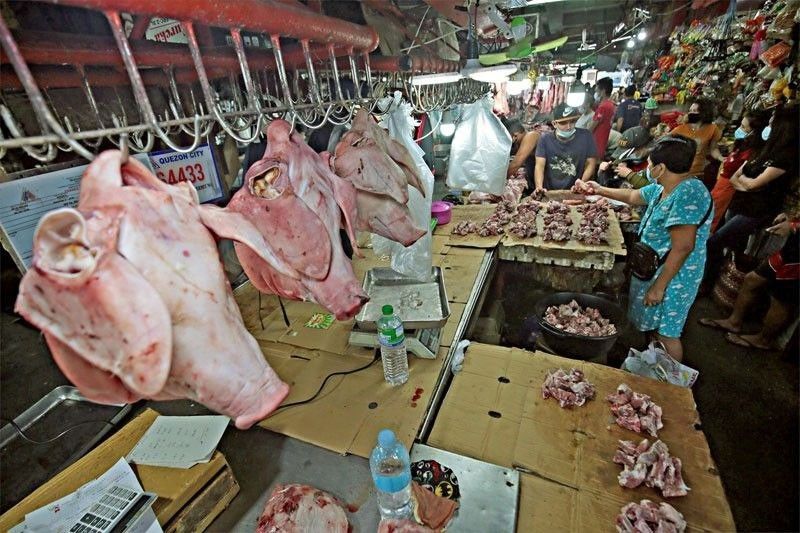NEDA: Hike in pork imports won’t kill Philippine hog industry

MANILA, Philippines — The National Economic and Development Authority has given assurance that the decision of President Duterte to increase the volume of imported pork and decrease tariff rates will not kill the local hog industry, but instead ensure adequate and affordable food supply and prevent higher malnutrition and poverty.
During the continuation of the Senate committee of the whole’s hybrid inquiry yesterday on the food security crisis brought about by the outbreak of African swine fever (ASF) in the country, NEDA acting Secretary Karl Kendrick Chua said Duterte’s Executive Order 128 is meant to help fill the deficit, reduce food prices and ensure the adequacy of food supply.
Chua said the Department of Agriculture’s proposal to increase the minimum access volume (MAV) for pork from 54,000 to around 404,000 metric tons is consistent with the supply deficit estimated by NEDA.
“The temporary increase in pork will not kill the long local hog industry as imports will potentially account for up to 22.8 percent of total consumption,” he told senators.
“Also, as mentioned by some experts, imports will not flood our market since ASF has also affected the production of many countries. In addition, the limited cold chain facility in the country serves as a physical barrier to huge importation since the total capacity is only estimated at around 260,000 metric tons for pork, given the requirements of other commodities,” Chua noted.
He believes that contrary to industry concerns, the proposed importation of 404,000 metric tons of pork will only gradually enter the country and as needed.
“The tariff rate for pork also needs to be low enough to help reduce and stabilize the retail price. Before the spike in pork price, the normal price of lean pork was around P224 per kilo. If we want retail prices to revert to this level, we also need to lower the tariff rate to complement the increase in MAV for a temporary period,” he explained.
“We need to help domestic producers recover from ASF. We also need to help 95 million consumers of pork... and increasing the MAV temporarily to help fill the deficit, reduce food prices, and ensure our food supply is adequate and affordable so that we can prevent higher malnutrition and poverty,” Chua stressed.
Withdraw EO 128
The Senate committee of the whole adopted the resolution urging Duterte to withdraw EO 128, which provides for the temporary modification of the rates of import duty for fresh, chilled or frozen meat of swine and to recall the recommendation to increase the MAV of pork.
The resolution, authored by Senate Minority Leader Franklin Drilon, was unanimously supported by 18 other senators led by Senate President Vicente Sotto III, chairman of the committee.
Drilon described the policies as “botcha” which should be immediately recalled. Botcha is the local word for double dead meat.
In yesterday’s hearing, the senators acknowledged the cry for help and fear of local hog raisers that imported pork will flood the market soon.
“Upon your direction Mr. Senate President, as chairman of the committee, we can now present a motion to adopt a resolution urging the President to withdraw EO 128… and recall the order to increase the MAV... if nothing changes until May 17, then we will take a more affirmative action of withdrawing the authority of the President of setting the tariff rates,” said Drilon.
The committee asserted that “the power to fix tariff rates and import quotas falls within the realm of the power of taxation, a power which is within the sole province of the legislature under the Constitution.”
The resolution was co-authored by Sotto, Senate President Pro-Tempore Ralph Recto, Majority Leader Miguel Zubiri, Senators Sonny Angara, Nancy Binay, Pia Cayetano, Leila de Lima, Richard Gordon, Risa Hontiveros, Lito Lapid, Panfilo Lacson, Imee Marcos, Manny Pacquiao, Francis Pangilinan, Grace Poe, Ramon Revilla, Joel Villanueva and Cynthia Villar.
Duterte issued EO 128 last April 7 reducing the in-quota tariff rate from 30 percent to five percent for the first three months and 10 percent for the 4th to 12th months and reducing the out-quota tariff rate from 40 percent to 15 for the first three months, and 20 percent for the 4th to 12th months.
Last March 26, when Congress was no longer in session, the President also sent Congress a letter to convey his proposal to increase the MAV to 350,000 metric tons from 54,210 MT.
The Senate, however, believed that the proposal to set the MAV to 350,000 MT for 2021 cannot take effect because the recommendation was sent to and received by the Senate when it was no longer in session.
The resolution also hit the Department of Agriculture for its failure to satisfactorily establish through accurate and reliable data that the country will have 388,790 MT of deficit in the supply of pork for the year, which necessitates the increase in MAV.
It said that based on the testimonies of the resource persons during the first hearing of the committee, there is reasonable basis to conclude that the new set of tariff rates and the huge increase in MAV can cause the demise of the local hog industry and cost the government billions in foregone revenue. It was reported that the foregone revenue could reach up to P11 billion.
Sen. Imee Marcos urged DA officials to help hog raisers from areas in Mindanao and Visayas that remain free of ASF, adding the department could help in the shipping cost and biosecurity measures, among others.
Sen. Panfilo Lacson asked Chua if the closure of hotels and restaurants due to the COVID-19 pandemic was factored in justifying the recommendation to increase the MAV in the increased importation of pork meat.
He noted that there is a 50 percent contraction in the operations of hotels and restaurants as registered by operators and that this should be considered in the projection on the demand for pork.
Chua said that based on per capita consumption, people will still have to eat 15 kilos of pork meat a year—whether taken at home or in hotels or restaurants.
Lacson filed Senate Resolution 685 to investigate the food security crisis brought about by the outbreak of African swine fever.
Senator Villar also questioned the National Meat Inspection Service for supposedly passing the responsibility of controlling the selling of pork online to local government units.
She said the NMIS should study and come up with means to control online sellers of pork and make sure they are selling ASF-free pork to clients.
“Why pass the responsibility to the LGUs? Online selling is now popular, so you have to do something about it and control it,” Villar added.
Jocelyn Salvador, NMIS OIC executive director, said they are already looking into the online selling of pork. — Edu Punay, Catherine Talavera
- Latest
- Trending



























